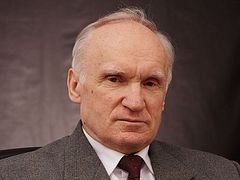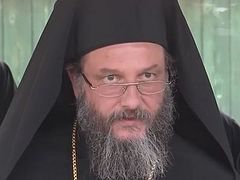Recently, in defense of Constantinople’s actions in Ukraine, some have commented that while repentance is nice as an ideal, “the healing of schisms has rarely involved repentance.”1 The implication is that repentance is optional, not necessary. In this vision of Church life repentance is no longer the only proper position of the Christian before Christ and a foundational prerequisite of Eucharistic communion, now repentance is merely a nice option. The examples offered to support this view are false as is the general premise. The ancient Church didn’t have any “no-fault” schism, any more than they had no-fault divorce.
The application of economy to bring about healing varies greatly, but repentance is never optional. The application of economy itself is geared toward helping those who are weak start the process of repentance. It is not a substitute for repentance. The teaching of the Church is that all the divisions of man are a result of sin and the only way to heal these divisions is repentance. Academic commissions, change in institutional structures, even canonical discipline or accommodation—none of these can heal division—only repentance. Possibly these things used rightly can help bring about repentance, but if they are not part of a process of repentance they are useless.
This idea of a no-fault healing of schism is part of a larger idea that the Church should be accommodating to everyone and this is love. Tradition teaches that love works to support everyone who has even the smallest desire to repent. However heaven is closed to those who justify themselves and do not do the work of repentance. God did not come to accommodate us in our sinful and fallen and divided state. This would not be love at all. He came to give us what is needed for repentance. In this effort to accommodate ourselves to Him we find ourselves transformed into His likeness.
The example put forward in support of the fact that schisms have been healed without repentance is the reunion of ROCOR with Moscow. Anyone familiar with the history of this process can see that this is false. The ROCOR clergy that I know who are willing to admit that during its time of separation from Moscow there was a tendency to become radicalized. This had to be repented of in the reunion and those who were not willing to repent schismed from ROCOR when the reunion with Moscow took place.
The repentance though did not begin with ROCOR. It started with the Moscow Patriarchate. As the Moscow Patriarchate engaged in a process of repenting of the renovationism and politicization of their church life, this positively effected things even before official efforts were made to heal the schism with the Russian Church Abroad. Moscow’s first action was not oriented toward the healing of schism, but toward healing itself and putting right its own life. We see Patriarch Alexiy in 1991 (ten years before any attempt to reach out to ROCOR) saying:
"Being a person of the Church, I must take on myself responsibility for all that occurred in the life of my Church: not only for the good, but also for the difficult, the sorrowful, the erroneous….
Today we can say that falsehood is interspersed in his (Met. Sergius) Declaration, which stated as its goal 'placing the Church into proper relations with the Soviet government. But these relations—and in the Declaration they are clearly defined as the submission of the Church to the interests of governmental politics—are exactly those which are incorrect from the point of view of the Church."
"Of people, then, to whom these compromises, silence, forced passivity or expressions of loyalty that were permitted by the Church leadership in those days, have caused pain—of these people, not only before God, but also before them, I ask forgiveness, understanding, and prayers."2
As Moscow put into practice what it was preaching, and as those in ROCOR made the effort to overcome fear and prejudice and trust that what they were seeing was genuine, this opened doors to start the process of repentance for them also. This repentance is recorded in an address by Abp. Mark of Berlin, Germany and Great Britain given at the Fourth All-Emigration Council in San Francisco in 2006.3
This address is a list of things that those in ROCOR repent of. They admit of a worldly and misdirected love for the Russian people that led them to a series of uncanonical acts that ended up wounding the Body of Christ. They confessed not only their uncanonical acts, but the underlying sin:
“Gradually, alas, we began to relate to the Moscow Patriarchate as we had to the Soviet regime, to some extent using the same terminology and the same mental constructs as we had in relation to the Soviet regime—in our perception we began to regard them as one and the same... Instead of thinking of how we could help the Church in Russia, we began to think in terms of a narrow party line, in a spirit which in many ways corresponded to that of the Greek Old-Calendarists.”
The confession goes on admitting that as Church life was restored to normal in Russia, and as it became more obvious that the Church there was reviving, ROCOR did not want to admit it. “Many of us did not want to listen to these voices or offer them support. Instead, we intensified our confrontation, while many of us forgot, or tried to forget, that we ourselves had not lived through any concentration camps, or pressure from the government, and that a particular part of our Church had not come out of its short period of coexistence with another dictatorship—that of Hitler—in altogether pristine condition.”4
Thus we can see how this repentance involved a frank admission not only of canonical sins, but also of where they themselves had strayed from a genuine Christian life and vision. It involved a conscious effort to quit blaming Moscow hierarchs for the past sins of caving to political pressure and recognize their own failings in this regard.
One instructive note is that Serbia had remained in communion with ROCOR throughout the time of their exile and it was Serbia who also encouraged them to wake up and see the changes in Russia. This relationship of ROCOR with a church that remained canonical but which was not immediately involved in the tensions between ROCOR and Moscow was helpful. In the current situation, Constantinople and Moscow both have those who are closer to them in culture and outlook and yet who are not immediately involved in the tensions, and by God’s grace may this be something saving. Sometimes I hear people who want to totally isolate either Constantinople or Moscow and I can only think to myself, “God save us.”5
An important insight of Abp. Mark is that “if there are no fundamental disagreements, we can easily live together in the one body of the Church with those specific individual features which distinguish a given individual or a given society”
It was a genuine Christian repentance of those things alien to Church life that brought the two churches (who had two very different starting places and errors and weaknesses) to the place where there was an agreement on the fundamentals of the Christian way of life. Once this fundamental sense of the other as truly engaged in the Orthodox struggle was present, then, given goodwill and Christian charity, other issues could be harmonized as long as no one demanded absolute fulfillment of all their conditions. There is a lot of room in the Church for accommodating human error and weakness as long as the fundamental Way, Truth, and Life are being honored.
Present in the current situation with Ukraine though is a question of these fundamentals. Divisions between political entities arise because of sinful passions. Divisions in the Church arise when someone is no longer willing to follow the Christian Truth or Way. Just looking at this area of repentance—obviously any idea that we should simply accommodate anyone that desires a church, and repentance is optional or not needed at all, is a denial of something fundamental in the life of the Church. The story of our redemption starts with St John the Baptist calling out, “Repent for the Kingdom of God is at hand… Bear fruits worthy of repentance.”6 After overcoming Satan’s temptations in the desert, Jesus Christ starts his ministry on the same basis.7 At Pentecost St. Peter again affirms that the basis of entrance into the Kingdom of Heaven, the Church, is repentance.8 The saints universally testify that the height of holiness can be achieved with nothing less than continual repentance. There is a very real sense in which we can say that if there is no repentance then there is no Church. Repentance is as foundational to our life in the Church as breathing is to our material life.
Only once there is admission of the need for repentance can positive spiritual movement start. This involves a process of self-examination, willingness to admit faults, and the struggle to be more truly Orthodox as a people and a local church. As we see in the example above, this process over time will lead to a healing of the schism. If even one party is involved in a process of repentance, this will positively effect all involved, and if the other party is moving in this direction too, each will see the image of Christ in the other and complete healing will come. If there is no spiritual movement, then likely the schism will remain despite whatever other measures are taken.
There is no culture, nor local church, nor people nor individual who has nothing to repent of. If we all do what we can in this area it will have far more effect on the overall good health of the Church than any amount of institutional changes or pan-Orthodox commissions. It is only in the presence of repentance that these other things can be effective. Archbishop Cyril in essence admits this in the rest of this interview when he mentions how creating a new structure did not change the basic attitudes or heal the conflicts. The old attitudes simply continued in the new structure. What will change this? Repentance.
Whether the new structure will be an aid to repentance or not is yet to be seen. Radical nationalism tends to die down and become a more healthy patriotism once a nation is more firmly established and the people feel safe. But will the new body then bog down in the general loss of Christian truth that is reflected in the position of those who support no-fault schisms and universal accommodation, or will a genuine Christian way of life start to take hold? The new structure is composed mostly of western leaning Ukrainians, and as we here in America can testify it is difficult to keep the faith alive in the midst of such a society.
The other example brought up to support the view that repentance is not central to healing schisms is the Novatian schism. In this schism, there were Christians who apostatized and offered sacrifices to idols under pressure. In the interview, this schism is explained as the Novatianists being very strict and not willing to accept the lapsers back, while the Orthodox were more accommodating. In fact this completely misses the real issue. The schism was not caused because of overly strict canonical penalties; rather, the Novatianists were denying the efficacy of the Sacrament of Repentance in cases of mortal sin. They were teaching that God alone could forgive these sins and that those who committed them should be barred completely from the Sacrament of Repentance (which was the gateway back into communion with the faithful). Thus the schism was not a matter of strictness vs. accommodation of certain sins, but a heresy that undermined the validity and efficacy of the Mystery of Repentance.
In fact, the Orthodox fathers had at that time a far longer and stricter process of penance then can be found almost anywhere today. That is because they and those willing to undertake this penance understood that a mere intellectual change is only the beginning of repentance and that considerable long laborious work is needed for the heart to genuinely feel repentant and open up to the grace that brings about true spiritual change. The lightness of penances today is a commentary on our weak spiritual state both as penitents and pastors. Anymore, the Church’s pastors and faithful allow God to work mostly through involuntary circumstances rather than voluntary penances, because men don’t have the humility needed to engage in the kind of work the ancients did.
There has been a tendency, particularly among more ecumenically minded individuals, to dismiss schism as merely a political and cultural phenomena that happens due to political passions, ethnic prejudice, and linguistic misunderstandings. This misses the underlying spiritual reality. Schism is a warning sign that fundamentals in the Christian Way of life are being violated.





Dear Maria & Anthony, absolutely. Ecumenism is an absolute heresy, & I know many bishops of the ROCOR who are still against it & ARE speaking to said bishops & clergymen to get them to stop & we see many clergy within the ROC and the ROCOR who are petitioning activities such as the Cuba meeting as well as participation in the horrific WCC. So yes, the Church holds many on every side of this issue, but the Church will stand firm even if it doesn't look how we want or expect it to.
https://www.youtube.com/watch?v=JUFYnwAZg5w